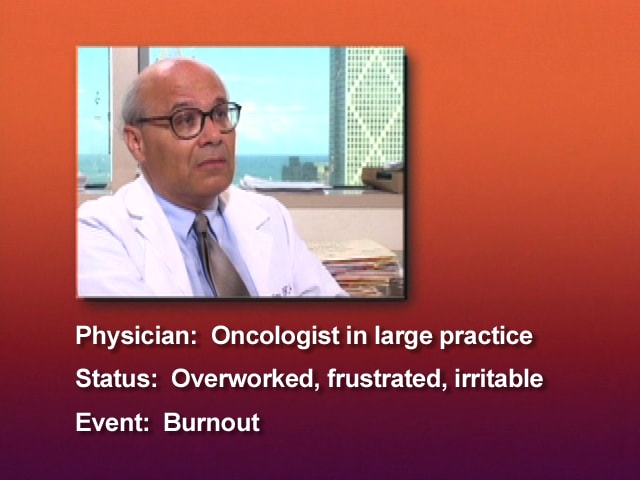Editor's Note:
This text has been excerpted and adapted from: Emanuel LL, Ferris FD, von Gunten CF, Von Roenn J, eds. EPEC™-O: Education in Palliative and End-of-life Care for Oncology(Module 15:Cancer Doctors and Burnout), Copyright The EPEC™ Project, Chicago, IL, 2005). The EPEC™-O curriculum was produced by The EPEC™ Project, with major funding provided by the National Cancer Institute, and with supplemental funding provided by the Lance Armstrong Foundation.
Compassion Fatigue and Burnout in Cancer Care
Working as a healthcare provider with patients who have cancer has many rewards, but can also be challenging and stressful. Healthcare providers caring for persons with cancer and their families are at increased risk of developing burnout and compassion fatigue, with potentially devastating consequences not only for themselves, but also for patients and families.

This oncologist is showing evidence of burnout -- anger, exhaustion, and detachment. His coworkers voice concerns.
Burnout
Burnout, a psychological syndrome, is a response to chronic interpersonal stressors on the job.[1]The concept of burnout was first developed in the 1970s.[2]
The 3 key dimensions of this response are:
Individual: overwhelming exhaustion; feelings of being overextended and depleted of one's emotional and physical resources;
Interpersonal: cynicism (or depersonalization) and detachment from the job. Cynicism refers to a negative, callous, or excessively detached response to various aspects of the job; and
Self-evaluative: sense of ineffectiveness and lack of accomplishment -- Ineffectiveness refers to feelings of incompetence and a lack of achievement and productivity at work.
Pines suggests, "The root cause of burnout lies in people's need to believe that their lives are meaningful, and that the things they do -- and consequently they themselves -- are important and significant."[3]Most healthcare professionals who are treated for burnout do not come in saying they are burned out.[4]Typically, they say, "There's something wrong with me. I don't care anymore. Terrible things happen in front of me, and I feel nothing."
Compassion Fatigue
Compassion fatigue is related to, but distinct from, burnout. Figley describes compassion fatigue as "a state experienced by those helping people in distress; it is an extreme state of tension and preoccupation with the suffering of those being helped to the degree that it is traumatizing for the helper."[5] Compassion fatigue is conceptualized as consisting of 2 parts: 1) symptoms associated with burnout, such as exhaustion, frustration, anger and depression; and 2) secondary traumatic stress, the negative effects of which may include fear, sleep difficulties, intrusive images, or avoidance of reminders of past traumatic experiences.[6] Healthcare workers are at increased risk for compassion fatigue, especially those involved with highly emotionally charged situations.
Medscape Nurses © 2011
WebMD, LLC
Cite this: Linda Emanuel, Frank D. Ferris, Charles F. von Gunten, et. al. Combating Compassion Fatigue and Burnout in Cancer Care - Medscape - Jun 06, 2011.




Comments